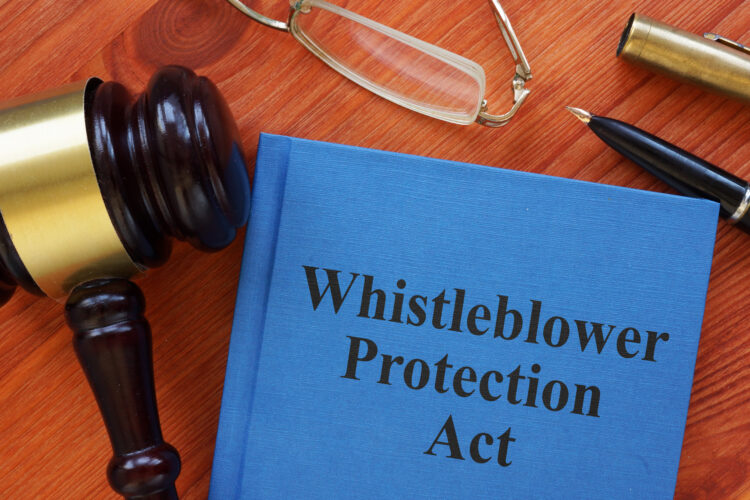July 15, 2024
There are nearly a quarter of a million active California state employees, which includes employees of state agencies and state universities, among other state employers. California’s state budget for the financial year 2023-2024 was $454.7 billion, the largest in the country by far.
With that scope of employees and vast funds, it is not surprising that corruption and other illegal behavior occurs within the ranks of state employees, far from the view of the taxpayers who fund the state government, and it is often only fellow state employees who are in a position to see and report such fraud and waste.
Acting as a whistleblower is not an easy task, and many would-be whistleblowers may feel concerned about retribution and retaliation by those engaged in wrongdoing. However, the California Whistleblower Protection Act offers increased protections for such whistleblowers, in addition to other state protective laws. Furthermore, the California False Claims Act provides a financial reward for whistleblowers who come forward with evidence in a successful lawsuit alleging fraud against the California state government.
What Is the Purpose of the Whistleblower Protection Act?
The purpose of the Whistleblower Protection Act is to provide state employees with the freedom to report waste, fraud, abuse of authority, violation of law, or threat to public health without fear of retribution, as the state legislature has found that “public servants best serve the citizenry when they can be candid and honest without reservation in conducting the people’s business.”
Specifically, the type of “improper governmental activity” that the Whistleblower Protection Act is designed to encourage reportage thereof includes any activity by a state agency or by a state employee that (1) is in violation of any state or federal law or regulation, including, but not limited to, corruption, malfeasance, bribery, theft of government property, fraudulent claims, fraud coercion, conversion, malicious prosecution, misuse of government property, or willful omission to perform a duty, or (2) is economically wasteful, or involves gross misconduct, incompetency, or inefficiency. This includes any such activity by any University of California school or an employee of such a school.
Who and What Is Protected Under the Whistleblower Protection Act?
All state employees (again, including any employee of a state university) are protected by the WPA from retaliation for reporting the types of “improper governmental activity” described above based on the WPA’s rule that no employee may “directly or indirectly use or attempt to use the official authority or influence” of their position “for the purpose of intimidating, threatening, coercing, commanding or attempting to intimidate, threaten, coerce, or command any person for the purpose of interfering” with another employee’s right to report improper governmental activity.”
The types of retaliatory behavior against a whistleblowing employee that are prohibited by the WPA include failure to promote an employee, termination or suspension of an employee, transferring an employee, or providing a faulty performance evaluation or disciplinary action. This also includes threatening to take such action or directing another to take or threaten such action.
Any employee who is wrongly retaliated against by another employee may pursue an action for compensatory damages, as well as potential punitive damages and attorney’s fees.
Can I Receive a Financial Reward for Reporting Fraud Affecting the California State Government?
Separate from the WPA, a person with knowledge of fraud carried out against the California state government may be eligible to earn a significant financial reward for pursuing a case against the offenders under the California False Claims Act (CFCA). Under the CFCA, a whistleblower who pursues a successful claim can receive as a financial reward anywhere between 15% to 33% of the financial penalties and fines levied against a defendant where the state government is a party to the litigation, and between 25% and 50% of such penalties and fines when the state government does not choose to join the litigation.
Since the enactment of the CFCA, over $2 billion has been levied against CFCA defendants, thus the financial rewards available to those who pursue a successful CFCA claim can be significant.
Any number of situations might qualify as grounds for a successful CFCA claim, but often such a situation involves an individual or entity receiving state government funds or reimbursements for goods or services that were not provided, not necessary, not what they purport to be, or of inferior quality. Examples of such fraud that might form the basis of a CFCA claim include, but are not limited to: filing false Medicaid reimbursement claims, selling defective products to the state, falsifying reports made to the state government to avoid paying funds to the state and/or to avoid regulatory scrutiny, or charging for services to the state that were not provided.
Contact a California Whistleblower Attorney Today
If you believe you have a knowledge of fraud that may form the basis of a successful CFCA claim, you are highly encouraged to work with experienced CFCA counsel to discuss and prepare your claim in a completely confidential environment.

